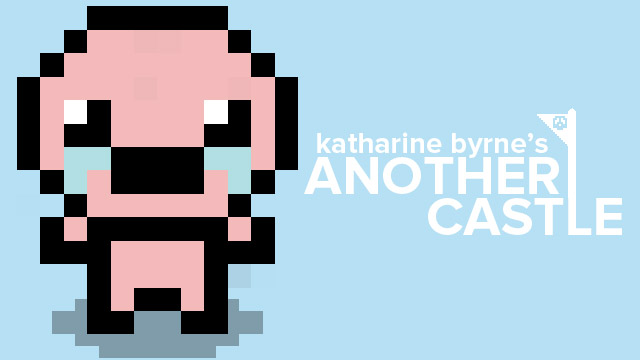 Team Meat’s The Binding of Isaac has been causing quite a stir recently. It all started on February 29th when Edmund McMillen, the game’s designer, wrote on Twitter that “…after a long internal debate Nintendo has decided NOT to allow The Binding of Isaac on the 3DS.”
Team Meat’s The Binding of Isaac has been causing quite a stir recently. It all started on February 29th when Edmund McMillen, the game’s designer, wrote on Twitter that “…after a long internal debate Nintendo has decided NOT to allow The Binding of Isaac on the 3DS.”
For those of you who don’t know very much about The Binding of Isaac, it’s a roguelike indie game based on the biblical story of the same name, in which Abraham is commanded by God to sacrifice his son, Isaac, to prove his faith. The game also follows the plight of a young boy named Isaac, only this time it’s Isaac’s mother whose faith is being tested. Fearing for his life, Isaac flees to his monster-infested (and randomly-generated) basement to escape his mother’s butcher’s knife, and retreats into the recesses of his nightmares with nothing but his own tears to defend himself.
Heavily inspired by The Legend of Zelda on NES, it’s received very favourable reviews since its release late last year, and McMillen was hoping it might enjoy equal success on 3DS’s eShop. Unfortunately, Nintendo has ruled that the game contains “questionable religious content”, meaning it will never be allowed on eShop now or in the future. To see some of that “questionable religious content” for yourself, the clip below is the game’s opening:
Watching the game’s opening, there’s little doubt that it does borrow quite heavily from the original story of the Binding of Isaac. It’s a story which can be found in the Torah, the Bible, and the Qur’an, but the crucial difference between the game and its religious source material is that each time God stops Abraham before he goes through with the sacrifice. Satisfied by his loyalty, God instead provides a ram caught in a bush for Abraham to sacrifice in Isaac’s place. Isaac’s mother, however, is not stopped by the voice from on high when she picks up her butcher’s knife and bursts in on her son’s vacant room. On the contrary, she’s only stopped in one of the game’s many endings when a Bible falls off a shelf and knocks her out (and even then that only happens in one of Isaac’s drawings).
I think part of the problem is the game depicts Isaac’s mother as a slightly crazed, and probably-in-need-of-help, religious zealot. It’s clear that her unerring faith is leading her down the wrong path, and her portrayal is somewhat upfront and unapologetic about the questions it raises: “What kind of mother would do that to her son?” it cries, or, perhaps more controversially, “What kind of God would ask a mother to kill her only son?”
It’s dodgy territory, to be sure, and it’s probably the latter question which has Nintendo so worried. At the same time, however, any risk of offence also depends how much stock you place in Isaac‘s story. If you put aside the game’s premise and focus entirely on the gameplay, it doesn’t really have that much to do with religion at all. Isaac may be down there trying to escape from his mother, but for the most part it’s simply about surviving the horrors of his basement. It’s a pretty sorry situation when you think about it too. Crying is his only form of “attack”, and with all the blood and excrement he has to wade though, you’d almost be forgiven for thinking he’d flushed himself down the toilet instead. Isaac must also graft strange and highly suspect-looking pieces of equipment to his body in order to increase his chances of survival, and looking at it this way, it’s almost more about the limits of human endurance (and the lengths you’re willing to go to in order to survive) than anything else.
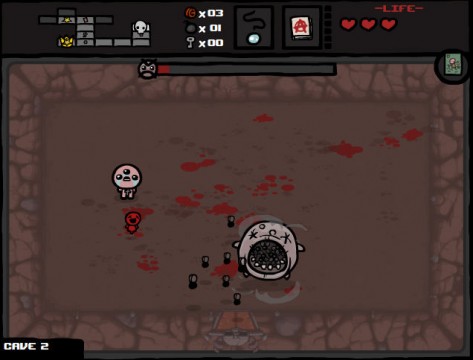
Perhaps Nintendo are more concerned about its links with Zelda.
However, the game also contains a number of religious-themed items, and the effects of these items vs. their religious significance might also be playing a part in Nintendo’s concern over the game’s “questionable religious content”. Such items include the Bible itself (which can instantly K.O Isaac’s Mom, Mom’s Heart or It Lives— rather ironic all things considered), Blood of the Martyr (a Crown of Thorns-esque item which increases the damage of Isaac’s tears and turns them into blood tears), Brimstone (which changes Isaac into a black demon), the Wafer (the consecrated bread used in the Eucharist which reduces all damage by half), and the Whore of Babylon (which transforms Isaac into the Whore of Babylon if he has only half a heart left, and will increase his damage by 3). Playable characters aside from Isaac also include Eve, Magdalene, Judas and Cain. These are all highly sensitive and charged references, particularly those surrounding the Crucifixion, and when you combine all of this with the game’s very distinct and recognisable homage to The Legend of Zelda, one of Nintendo’s key and most child-friendly franchises, perhaps Nintendo’s reaction doesn’t look that surprising after all.
Personally, I think Nintendo’s right to be concerned about its family-friendly image, but at the same time, isn’t that what ratings are for? One game that immediately springs to mind is Visceral Games’s Dante’s Inferno from 2010. It may not have been released for Wii or have been based on an actual religious text– Dante Alighieri’s Divine Comedy was only poetry after all– but it nevertheless deals with several religious themes. Everything from EA’s marketing campaign with fake Christian protests to Dante’s Holy Cross weapon and in-game devil exorcism is perhaps as equally “questionable” as The Binding of Isaac, but Dante’s Inferno escaped with an M rating from the ESRB, and an 18 age-rating over here in the UK. Why can’t the same thing apply for The Binding of Isaac?
Then again, Nintendo has been particularly wary of religious content over the years, and it’s certainly not the first time such religious censoring has reared its head. Before the days of ESRB ratings back in the late 1980s and early 1990s, Nintendo of America had a specific policy on game content which read as follows:
The following Game Content Guidelines are presented for assistance in the development of authorized game paks […] by defining the type of content and themes inconsistent with Nintendo’s corporate and marketing philosophy. Although exceptions may be made to preserve the content of a game, Nintendo will not approve games for the NES, Game Boy or Super NES systems (i.e., audio-visual work, packaging, and instruction manuals) which:
[among other things] – reflect ethnic, religious, nationalistic, or sexual stereotypes of language; this includes symbols that are related to any type of racial, religious, nationalistic, or ethnic group, such as crosses, pentagrams, God, Gods (Roman mythological gods are acceptable), Satan, hell, Buddha.
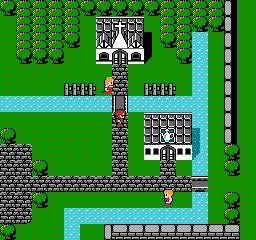
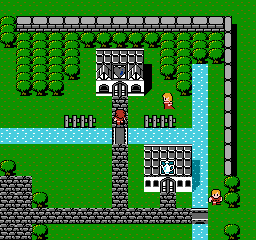
On the left is the Japanese “church”; on the right is the altered US “clinic”.
Remember all those “clinics” in Final Fantasy? Those were originally churches with crosses on the outside. Crosses were also heavily edited out of the early Castlevania games too, though Castlevania III: Dracula’s Curse somehow managed to escape with several of its religious icons in tact, most notably the cross in the opening to the game’s first level. Even The Legend of Zelda: Ocarina of Time received a few cosmetic changes, as Link’s Mirror Shield originally looked like this:
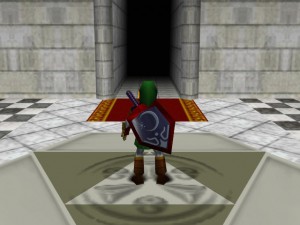
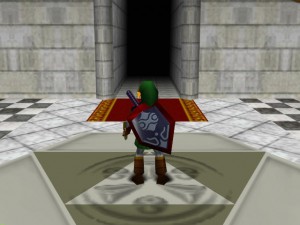
On the left is the original Gerudo design, one which looks very much like the Islamic Star and Crescent symbol; on the right is the altered Gerudo design that’s been used in every subsequent version of Ocarina ever since.
ActRaiser for SNES was also a game which had much of its story altered to fit in with the censorship policy. Originally called God, the main character’s name was re-branded as “The Master”, and the villain, once Satan, was renamed “The Evil One”. But this puts a decidedly different spin on the game’s narrative, as The Master’s name suggests a slightly more oppressive and dictatorial figure (or, for the Doctor Who fans out there, a loony psychopath with the sound of drums in his head). You may not ever control The Master directly– his angel sidekick and animated statue form cover the respective simulation and action parts of the game– but part of your job as world saviour is to ride around in your cloud palace and decide how to perform miracles, slay demons, and encourage people to pray to you. It might just be semantics at the end of the day, but to me, a “Master” performing all of the above is just a little bit more sinister than a “God” or any other kind of deity.
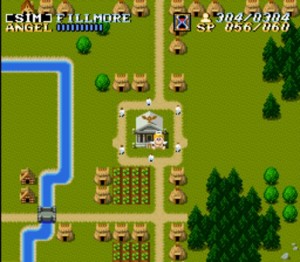 Equally, however, if it is just a matter of semantics, why bother in the first place? The religious allegory in ActRaiser is arguably pretty obvious to anyone with a couple of functioning brain cells, so why put such a thin veil over the game’s religious elements at all? The same goes for Final Fantasy‘s “clinics”. Likewise, anyone who’s played Dead Space: Extraction will also know that the game’s Unitology religion is very much based off another similar-sounding “religion” (one that begins with “S” and ends in “cientology”), and it makes one wonder whether Nintendo would be making such a fuss about The Binding of Isaac if it was simply covered up as “The Binding of Bob”, or if the voice of God was simply called “The Voice” instead. It achieves the same thing at the end of the day– it removes any overt religious connotation and makes any “questionable” content far less “questionable”– and if it worked for ActRaiser and Dead Space, it’s not too much of a stretch to say it wouldn’t work for The Binding of Isaac too.
Equally, however, if it is just a matter of semantics, why bother in the first place? The religious allegory in ActRaiser is arguably pretty obvious to anyone with a couple of functioning brain cells, so why put such a thin veil over the game’s religious elements at all? The same goes for Final Fantasy‘s “clinics”. Likewise, anyone who’s played Dead Space: Extraction will also know that the game’s Unitology religion is very much based off another similar-sounding “religion” (one that begins with “S” and ends in “cientology”), and it makes one wonder whether Nintendo would be making such a fuss about The Binding of Isaac if it was simply covered up as “The Binding of Bob”, or if the voice of God was simply called “The Voice” instead. It achieves the same thing at the end of the day– it removes any overt religious connotation and makes any “questionable” content far less “questionable”– and if it worked for ActRaiser and Dead Space, it’s not too much of a stretch to say it wouldn’t work for The Binding of Isaac too.
Ultimately, though, the core issue behind The Binding of Isaac‘s ban from eShop isn’t really about dancing around the game’s religious overtones by altering a word here or an item there– as McMillen wrote in another tweet, it’s about the restrictions placed on developers and the lack of freedom they have to develop games the way they want. He said, “Seriously though, I gotta again publicly thank Steam for fully supporting Isaac and not requiring ESRB or censoring its published games.” That doesn’t mean McMillen’s fallen out with Nintendo (“FYI everyone, we are not at all on bad terms with Nintendo. It’s their platform their rules, this won’t affect any future games with them!”), but it just goes to show how Nintendo are still reluctant to embrace a more mature and adult image. Then again, for all Nintendo’s bold and striking steps in terms of hardware innovation, they’ve always been rather slow when it comes to keeping up with the times, whether it’s online gaming, embracing new trends like DLC or, indeed, mature games. Wii U’s Nintendo Network may change all of that, but when one considers all the other mature games out there that are infinitely less controversial, maybe The Binding of Isaac is just one religious allegory too much for now. After all, baby steps are Nintendo’s speciality, and all things considered, The Binding of Isaac is probably one stride short of a triple long-jump!




 ShareThis
ShareThis







Please name a modern game where Nintendo has censored “religious content.” Also, a single tweet from a team that has had their games pulled off of several other digital stores for disrespecting NDAs is not cause for a “Nintendo is censoring everything again” reaction.
Well, it’s difficult to name a modern Nintendo game with censored religious content because there haven’t been any! All those sorts of games are either on other consoles, or have got round the problem with the rating system. I didn’t meant to imply that Nintendo’s now going to censor everything – I only meant to say that The Binding of Isaac is probably a bit like diving in at the deep end with their ’embracing more mature content’ strategy.
When we only have one side of the story, it’s fair to point out that much of what Team Meat says and does is (purposefully) nothing more than self-promotion. There is no bad publicity, right? So the more noise they make about being poor censored “artists”, the more money they make.
I don’t care much about this game, and i really respect Nintendo for following its principles, as a ninte do fan i know that im never gonna have a first party controversial game, i don’t care if i cannot play gore or religious content games of third parties either. For that kind of games i already own a ps3 and in the next generation of consoles i guess i will have a ps4. But i preffer Nintendo to follow their phylosophy, otherwise it wouldnt be nintendo.
It’s an interesting little game – I’ve tried to play it several times, and each time I get my ass severely kicked because it’s so hard! I also respect Nintendo’s decision, but I think it’s a shame that people have to go elsewhere for those sorts of games. If Nintendo is really serious about embracing mature content and winning back gamers with Wii U and 3DS, then The Binding of Isaac would have been definite proof that they were serious about it. As I said in the article, I think The Binding of Isaac is a step too far just now – they could have done with accepting a slightly less controversial title onto eShop first – but it nonetheless casts a shadow over their supposed commitment to mature games.
That’s part of the trick though: is Nintendo serious about embracing mature content, or is it just lip service to expand their audience?
The truth is probably somewhere in the middle. Being more open to mature games doesn’t mean that Nintendo will risk damaging their family-friendly brand for something as trivial as publishing an indie game that is intentionally controversial on their digital platform. Can’t say I blame them: there is a lot more to be lost than gained from their standpoint.
This must apply to more than just micro-transactions:
“As a hardware manufacturer, or platform holder, it would be better to present third-party developers with as much freedom as possible. Some say that the guidelines and regulations we previously established are too strict and behind the times, and others say that Nintendo should not put too many restrictions on the features of software targeting the consumers who are familiar with micro-transactions. Therefore, we plan to ensure a relative level of flexibility for the Nintendo 3DS and the Wii U software compatible with the Nintendo Network as long as the developer has built a trusting relationship with consumers, except for the cases that consumers will be too disadvantaged.”
“On the other hand, the reason I refer to Nintendo as a software developer is that we have a belief that our games should be a trusted brand for a very wide variety of consumers, including children and casual users who are not so familiar with the trends of video games. Therefore, we would like to have regulations with a certain degree of strictness so that consumers will get a sense of reassurance from our games. I am not saying that Nintendo is better than third-party developers. Each developer has its own customer base, and we should be more careful with this point for Nintendo consumers.” – Satoru Iwata
http://nintendoeverything.com/81941/nintendo-will-be-flexible-with-their-micro-transactions-regulations/
http://www.gonintendo.com/?mode=viewstory&id=170997